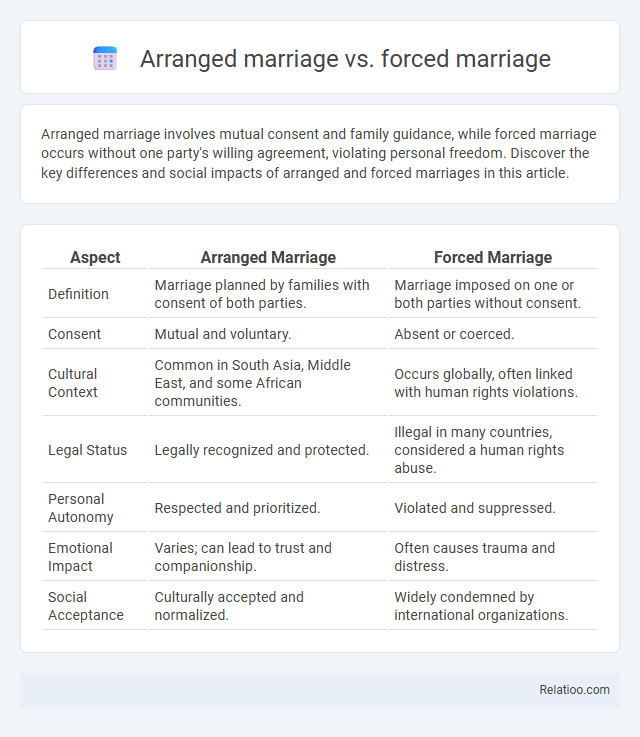Arranged marriage involves mutual consent and family guidance, while forced marriage occurs without one party's willing agreement, violating personal freedom. Discover the key differences and social impacts of arranged and forced marriages in this article.
Table of Comparison
| Aspect | Arranged Marriage | Forced Marriage |
|---|---|---|
| Definition | Marriage planned by families with consent of both parties. | Marriage imposed on one or both parties without consent. |
| Consent | Mutual and voluntary. | Absent or coerced. |
| Cultural Context | Common in South Asia, Middle East, and some African communities. | Occurs globally, often linked with human rights violations. |
| Legal Status | Legally recognized and protected. | Illegal in many countries, considered a human rights abuse. |
| Personal Autonomy | Respected and prioritized. | Violated and suppressed. |
| Emotional Impact | Varies; can lead to trust and companionship. | Often causes trauma and distress. |
| Social Acceptance | Culturally accepted and normalized. | Widely condemned by international organizations. |
Introduction: Understanding Arranged and Forced Marriages
Arranged marriage involves families facilitating a partnership with mutual consent between individuals, emphasizing cultural traditions and compatibility. Forced marriage occurs when one or both individuals are coerced or pressured against their will, violating personal autonomy and human rights. Distinguishing these concepts is crucial for addressing social expectations and protecting individual freedoms in diverse cultural contexts.
Defining Arranged Marriage: Traditions and Practices
Arranged marriage involves families or matchmakers selecting potential spouses based on compatibility, cultural values, and social status, with the consent of both individuals. It is rooted in traditions where parents or elders play a significant role in fostering unions that align with community expectations and long-term stability. Your understanding of arranged marriage should differentiate it clearly from forced marriage, where consent is absent, highlighting the importance of choice within cultural practices.
Defining Forced Marriage: Key Characteristics
Forced marriage is a union where one or both parties are coerced into marriage without their free and full consent, distinguishing it from arranged marriage where families facilitate introductions but consent remains individual and voluntary. Key characteristics of forced marriage include lack of consent, use of threats, intimidation, or physical violence, and often violation of human rights and legal statutes. Unlike arranged marriages, forced marriages disregard the autonomy and choice of the individuals involved, leading to significant psychological and social consequences.
Cultural Perspectives on Marriage
Cultural perspectives on marriage deeply influence the distinctions between arranged and forced marriages, with arranged marriages often rooted in traditions where families select compatible partners with mutual consent, preserving cultural values and social harmony. Forced marriages violate individual autonomy, disregarding personal choice and frequently resulting in psychological and social harm, contrasting sharply with the ethical foundations of arranged unions. Understanding these cultural contexts helps you appreciate the significance of consent and respect within marital practices worldwide.
Consent: The Core Difference
Consent is the fundamental distinction between arranged and forced marriages, where arranged marriage involves mutual agreement from both parties after introduction and family facilitation, ensuring voluntary participation and personal choice. Forced marriage occurs without the free and informed consent of one or both individuals, often involving coercion, threats, or pressure, violating human rights and legal standards worldwide. Arranged marriages respect personal autonomy and consent, contrasting sharply with forced marriages that deny individual freedom and legal consent requirements.
Legal Framework and Human Rights Issues
Arranged marriages are conducted with the consent of both parties and are legally recognized within many countries' frameworks, emphasizing voluntary agreement and mutual respect. Forced marriages violate human rights laws, including the right to free consent for marriage, and are prohibited under international treaties such as the UN Convention on Consent to Marriage. Legal systems worldwide differentiate arranged marriage from forced marriage by assessing consent, with forced marriage cases often involving protective measures to safeguard individuals from coercion and abuse.
Social and Emotional Impacts
Arranged marriage often fosters social support through family involvement, promoting community cohesion and emotional stability by ensuring mutual consent and compatibility. In contrast, forced marriage undermines personal autonomy, causing severe psychological trauma, social isolation, and long-term emotional distress for Your well-being. Understanding the stark differences highlights the importance of consent and mutual agreement in building healthy social and emotional foundations in marriage.
Common Myths and Misconceptions
Arranged marriage is often misunderstood as forced marriage, but the key difference lies in consent; arranged marriages involve families facilitating introductions while both parties retain the right to accept or reject the match. Common myths include the belief that arranged marriages lack love or compatibility, whereas many couples develop strong emotional bonds over time. Forced marriage, distinct from arranged marriage, violates personal autonomy and legal rights, and addressing misconceptions is crucial to protect individual freedom and promote informed choices.
The Evolving Role of Family and Community
The evolving role of family and community in arranged marriage emphasizes mutual respect, consent, and compatibility, contrasting sharply with forced marriage, where coercion overrides individual choice. Families now often act as supportive facilitators, ensuring your preferences and well-being are prioritized during the matchmaking process. Community involvement fosters cultural continuity while adapting to modern values of autonomy and personal freedom.
Pathways Toward Empowerment and Autonomy
Arranged marriages, when consensual, often provide a structured pathway toward empowerment by balancing family involvement with individual autonomy, allowing partners to build mutual respect and shared decision-making. In contrast, forced marriages undermine autonomy entirely by removing personal choice and agency, frequently resulting in diminished psychological well-being and restricted freedoms. Empowerment in arranged marriage contexts is bolstered through open communication, informed consent, and legal protections that uphold personal rights within culturally sensitive frameworks.

Infographic: Arranged marriage vs Forced marriage
 relatioo.com
relatioo.com